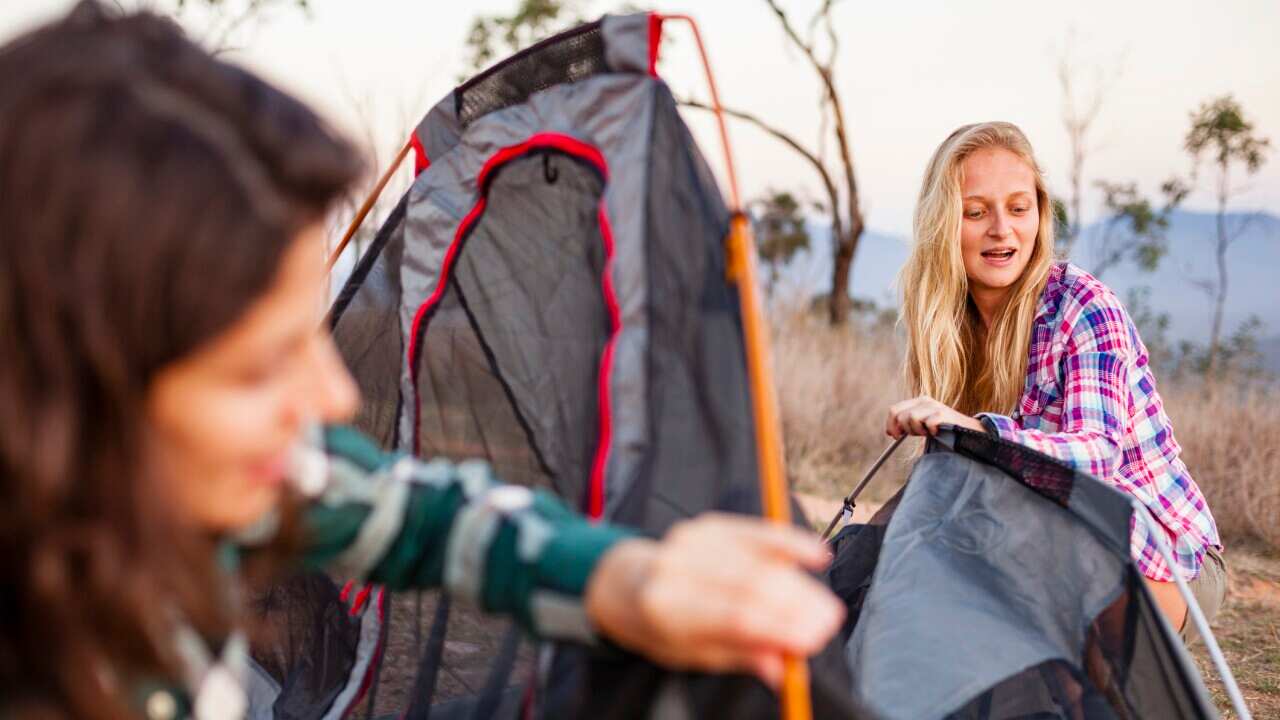This lesson suits upper-intermediate to advanced learners. After listening, scroll down and test your knowledge with our quiz.
Learning notes
Language objective
How to talk about different types of schools and becoming a parent volunteer
Ways to talk about different types of schools
- We’ve enrolled our daughter in a private, all-girls school.
- She met the girls in her house during orientation and they really hit it off.
- My husband and I had to really brainstorm on schools for our son because he needs extra support.
- We found a great government school in our area.
- Her school focuses on the well-being of the kids, not just on grades.
- The facilities are great!
- For us, proximity is important.
Different phrases to use about becoming a parent volunteer
- Do you have canteen duty today?
- I’m rostered on today!
- I just need to get my Working with Children Check and then I can start.
- A perk is that you can get free lunch for you and your son.
- You’ll be able to keep an eye on your son even when he thinks you’re not around.
- Hope you can help me learn the ropes!
Colloquial expressions:
To hit it off means to get along well.
When you keep an eye on someone, you are watching them closely or making sure you know about what they are doing.
To learn the ropes means to learn how to do a particular job or task.
Vocabulary:
Enrol – officially register in a school as a student
Private school – A school that is run by either a private organisation or private individuals. In Australia, these may be independent or run by a religious organisation
Single sex school – A school that only takes either girls or boys
Co-ed – short for ‘co-educational’ school – A school, that takes all genders
House – Students are often divided into groups called ‘houses’ when they go to a school. Houses have members from across the different year levels and may compete with one another in sports and other activities.
Orientation – an event where new students are invited to see their new school and are introduced to its culture, students and programs
Brainstorm – a group discussion to produce ideas and ways of solving problems
Impairment - decrease or loss of function or ability
Government school – also known as a public school, is funded by the government. Attendance is free , but there is often a small fee may to pay for equipment or materials.
Well-being – state of being happy, healthy and/or comfortable
Facilities – places or equipment that people can use. For example, a playground in a school is a facility.
Proximity – a place that is nearby
Canteen duty –a type of volunteer work in which parents help in the school canteen
To be rostered – to be given work at a particular time
Working with Children Check – a screening process to check that people are allowed to work with or care for children
Perk – a benefit or advantage
Cultural information:
In Australia, you can choose to send your child to a government-funded (often called a state or public) school, or a non-government or private school, which may be run by a private or religious organisation.
While most schools will follow a similar curriculum, there are also special government schools which cater for children with conditions that need special attention, and also some schools that cater for children with high intellectual ability.
Parents can also choose to be active in their children’s schools by signing up to volunteer in the school canteen, during school excursions and events, and in committees and cultural groups.
For newly-arrived school children to Australia who need extra support in English, English as an additional language or dialect (EAL/D) programs and support are available.
Transcript:
(Note: This is not a word-for-word transcript)
SBS acknowledges the Traditional Custodians of Country and their connections and continuous care for the skies, lands and waterways throughout Australia.
Hi, my name is Nikki and like some of you, I have a little one starting school this year!
One of the most exciting and scariest things about school actually happens before it begins – it’s the choosing!
This was how it was for Claire and Allan. Let’s listen in on their conversation about how they chose a new school for their children.
Claire
Your daughter is starting school soon, right? How exciting! Which school did you enrol her in?
Allan
Yes, we’re very excited! We’ve enrolled her in a private, all-girls school.
Claire
Does she like it?
Allan
She met the girls in her house during orientation and they really hit it off. What about your son?
Claire
Well, my husband and I had to really brainstorm on schools for our son because he needs extra support for his hearing impairment. Luckily, we found a great government school for him in our area.
Quite a bit of information there, huh? Let’s go through it slowly.
Allan and Claire talked about their choices for schools.
Allan says,
We’ve enrolled her in a private, all-girls school.
Public schools are operated and run by the government and have lower fees than private schools. Private schools can be run by either independent organisations or religious groups.
When a child starts in a school we say that they enrol.
An all-girls school is an example of a single sex school. There are also schools that only allow in boys.
When all genders are allowed into a school, it is called co-ed, which is short for ‘co-educational’.
Allan is happy about the school he chose for his daughter because
She met the girls in her house during orientation and they really hit it off.
An orientation is an event in school where new students are invited to see their new school and are introduced to its culture and programs.
Students are placed in groups called houses. Each house has members from across the different year levels.
While Allan chose to send his daughter to private school, Claire decided on another type of school.
She says,
Well, my husband and I had to really brainstorm on schools for our son because he needs extra support for his hearing impairment. Luckily, we found a great government school for him in our area.
To brainstorm means to be part of a discussion to come up with ideas and solutions.
Claire’s son needs extra support because of his hearing impairment. We say that someone has a ‘hearing impairment’ if they can’t hear very well or at all.
There are also special schools and programs for children with high intellectual ability. These are called .
So now that we know where Allan and Claire’s children are enrolled, what are their reasons for liking their choices?
Let’s go back to their conversation.
Allan
We like the fact that her school focuses on the well-being of the kids, not just on grades. The facilities are great as well!
Claire
For us, proximity is really important. We’ll be able to walk to school instead of having to worry about driving!
Those are great reasons for both!
Let’s hear them again. First, Allan says,
We like the fact that her school focuses on the well-being of the kids, not just on grades.
Well-being is the state of being happy, healthy and/or comfortable.
Allan also says:
The facilities are great!
Facilities are the places and pieces of equipment that are in the school for the children to use, such as the playground or gym.
Claire also shares what she likes about her son’s school,
For us, proximity is really important.
Proximity here means is how close the school is to where Claire lives.
In Australia, it is very common for parents to volunteer, that is, to help out in their child’s school.
Let’s listen in on a conversation between Allan and Claire – only this time, they are parents talking about volunteering in the canteen of their children’s school.
Allan
Hi Claire! Do you have canteen duty today?
Claire
Yes, I’m rostered today! Are you planning to volunteer as well?
Allan
Yes! I just need to get my Working with Children Check and then I can start.
Before continuing to listen to their conversation, let’s look more closely at what they just said.
We learned that Claire is on canteen duty today. Do you remember the phrase she used to say that she is volunteering today?
I’m rostered today!
To be rostered means to have been given a particular time to work.
Allan is also planning to volunteer and says,
I just need to get my Working with Children Check and I can start.
A Working with Children Check is a screening process to check that people are allowed to work with or care for children.
Now let’s go back to Allan and Claire’s conversation.
Claire tells Allan some of the benefits of volunteering in the canteen.
Claire
A perk is that you can get free lunch for you and your son, but aside from that, you’ll also be able to keep an eye on your son when he thinks you’re not around.
Allan
Haha, true! Hope you can help me learn the ropes!
Claire
Of course!
Maybe volunteering for canteen duty is something you’d like to try because there are many benefits, like the ones Claire mentioned
A perk is that you can get free lunch for you and your son.
A perk is a benefit or advantage.
Free lunch is one of the perks of volunteering in the canteen.
Sounds awesome!
Another perk of volunteering is…
You’ll be able to keep an eye on your son when he thinks you're not around.
To keep an eye on someone, means to watch someone closely or know what they are doing.
Allan says,
Hope you can help me learn the ropes!
To learn the ropes means to learn how to do a particular job or task.
We've learned some of the support children with disabilities and children with high intellectual ability can receive from school.
But what about support for newly-arrived migrant students who want to improve their English skills?
We have with us today Cindy Valdez-Adams, the President of the for short, to talk about just that.
Cindy
Hi, Nikki!
Nikki
Hi, Cindy! What kind of support do you give to schools and teachers?
Cindy
We do a lot, for schools, we provide resources and for our teachers, we conduct workshops to develop learning and teaching strategies to develop the English language.
Nikki
How about parents?
Cindy
Do you know that it’s actually really important to continue speaking your first language at home while learning English in school? We found that those who are fluent or know their first language really well are able to learn and understand English more easily. So don’t lose your first language. Not only is it important when it comes to learning English, it’s important when it comes to maintaining your own identity.
Nikki
That’s true! What other important things do English learners have to be aware of?
Cindy
That learning everyday English can be challenging – even more so if it’s academic English. It can take up to 5-7 years for migrant students to catch up with the English terms and phrases used in subjects like science or history.
Learning can be challenging, but I encourage you to keep on going and to be patient with yourself. You can do it! There is support in school to help you get better at English. You’re not alone.
A big thank you to our educational consultant Professor Lynda Yates, our guests Cindy Valdez-Adams from and TJ Correa, and Paul Nicholson and Lily O'Sullivan who voiced the characters of Allan and Claire.












